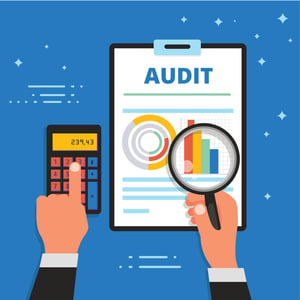Sales Tax Scaries 4: Nexus and Taxability
When Sales Tax Creeps Up on You
Ever notice how the first characters in every horror movie never...

It’s been over a year since economic nexus was put into effect, and state and local jurisdictions have started knocking on doors to start collecting. Whether you are intentionally or unintentionally neglecting your sales tax obligations, the chance of audit is continuing to grow.
 And here’s why: sales tax is a significant revenue source for a state. In fact, according to Tax Policy Center, it can be the leading source for many departments, comprising 25%-35% of a state’s revenue.
And here’s why: sales tax is a significant revenue source for a state. In fact, according to Tax Policy Center, it can be the leading source for many departments, comprising 25%-35% of a state’s revenue.
The unintended consequence of the Wayfair decision is that it has made it more complex for businesses to understand how to become compliant. There are thousands of jurisdictions, each with their own intricacies, that have made sales tax a tremendous headache for businesses.
Unfortunately, there isn’t a playbook for determining the company profile a state will go after but there are proactive measures you can take to minimize your exposure:
Understand physical and economic nexus. Knowing where you have sales tax nexus is the key to determining both your liability and your defense for an audit. Understand the thresholds and qualifications in the jurisdictions where you have significant sales. Without sales tax nexus, you have no obligation to collect or remit sales tax
Nexus is your company’s connection with a state that’s substantial enough for that state to hold you accountable to their sales tax laws. This is frequently determined by a minimum number of sales or minimum dollar amount of sales, generally during a year. You can also generate nexus by traveling into states (say for a sales pitch or demo), using subcontractors in given states to fulfill contracts with customers, or even by just exhibiting at trade shows.
It’s a good idea to review your sales tax nexus footprint periodically to make sure nothing has changed in the business.
2. Evaluate the Taxability of Your Products/Services. Not all goods and services are taxable in all jurisdictions. For some businesses, the taxability of their products/services does not have a lot of variability. For example, tangible personal property (TPP) will be taxable unless the specific type of TPP you are selling is identified as non-taxable by statute. Other products/services tend to have disparate tax rules across states and tend to change over time as well.
The technology field comes to mind – specifically SaaS, electronically delivered software, data processing, digital downloads and telecommunications services. The statutes are in constant flux around these types of products and the taxability of your transactions should be reviewed periodically to ensure you are calculating tax properly.
One of the first pieces of paperwork an auditor will want to see are your exemption certificates, which substantiate exempt sales you claimed. Keep these forms organized, on hand and up to date.
Make sure you’ve complied. Back-track to make certain your company hasn’t neglected to file sales and use tax returns. Have you collected sales tax and failed to remit it? Have you received notices from a jurisdiction? If you have received notices and then continued noncompliance, you’ll probably trigger an audit.
(Worse, sometimes audits can also be triggered by a company actually trying to make good on past negligence – failure to collect and remit tax for a period after registering as a business in a state, for example, then registering with that state’s revenue authority and beginning to collect and remit tax. Jurisdictions often cross-check registrations and can spot find the early negligence.)
Keep careful records on correspondence with tax jurisdictions, and don’t assume the problem will simply go away.
Know if your customers or competitors have been audited. Audits tend to beget audits. If one of your clients, suppliers or partners is audited and the jurisdiction found that you didn’t charge the client sales tax on a transaction, you may get audited. Make sure you are charging sales tax under all appropriate circumstances and, again, have valid exemption certificates on file.
Know your competitors, too. Have they been audited? Businesses in the same line or industry tend to have similar business models. Auditors know these models and often investigate whether non-compliance at one business means non-compliance at other, similar businesses.
Defending yourself in a sales-tax audit can take a lot of resources. Let TaxConnex help you prepare for investigations and stay on top of this ever-changing tax environment. Contact us to learn about the latest developments in sales-tax nexus and what they mean to you and your company.
Looking for more information on how to protect yourself from audits, download our eBook -

Ever notice how the first characters in every horror movie never...
Copyright © 2025 TaxConnex, LLC